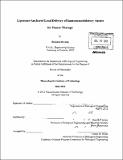| dc.contributor.advisor | Darrell J. Irvine. | en_US |
| dc.contributor.author | Kwong, Brandon (Brandon Wai-Sing) | en_US |
| dc.contributor.other | Massachusetts Institute of Technology. Dept. of Biological Engineering. | en_US |
| dc.date.accessioned | 2013-01-07T21:22:03Z | |
| dc.date.available | 2013-01-07T21:22:03Z | |
| dc.date.copyright | 2012 | en_US |
| dc.date.issued | 2012 | en_US |
| dc.identifier.uri | http://hdl.handle.net/1721.1/76115 | |
| dc.description | Thesis (Ph. D.)--Massachusetts Institute of Technology, Dept. of Biological Engineering, 2012. | en_US |
| dc.description | Cataloged from PDF version of thesis. Page 175 blank. | en_US |
| dc.description | Includes bibliographical references (p. 161-174). | en_US |
| dc.description.abstract | Immunostimulatory therapies that activate immune response pathways are of great interest for overcoming the immunosuppression present in advanced tumors. Agonistic antibodies against the co-stimulatory receptors CD40 and CD137, Toll-Like Receptor (TLR) ligands such as CpG oligonucleotides, and immunostimulatory cytokines such as IL-2 have all previously demonstrated potent, synergistic anti-tumor effects. However, the clinical use of such therapies is significantly hampered by the severe, dose-limiting inflammatory toxicities provoked upon systemic exposure. We hypothesized that by anchoring immunomodulatory agents to lipid nanoparticles we could retain the bio-activity of therapeutics in the local tumor tissue and tumordraining lymph node, but limit systemic exposure to these potent molecules. We first prepared liposomes bearing surface-conjugated anti-CD40 and CpG and assessed their therapeutic efficacy and systemic toxicity compared to soluble versions of the same immuno-agonists, injected intratumorally in established solid tumors in mice. Anti-CD40/CpG-coupled liposomes significantly inhibited primary tumor growth and induced a survival benefit similar to locally injected soluble anti-CD40+CpG. Biodistribution analyses following local delivery showed that the liposomal carriers successfully sequestered anti-CD40 and CpG in vivo, reducing leakage into systemic circulation while allowing draining to the tumor-proximal lymph node. Contrary to locally administered soluble immunotherapy, anti-CD40/CpG liposomes did not elicit significant increases in serum levels of ALT enzyme, systemic inflammatory cytokines, or overall weight loss, confirming that off-target inflammatory effects had been minimized. Thus, these results confirmed the development of a delivery strategy capable of inducing robust antitumor responses concurrent with minimal systemic side effects. We next assessed the dissemination of the tumor-specific immune response that had been primed by locally administered, liposome-conjugated therapy. Since anti-CD40/CpG-coupled liposomes were unable to consistently induce the rejection of a secondary distal tumor challenge, we adapted the strategy of liposome-coupled delivery for the administration of anti-CD 137 and IL-2, two potent T cell-stimulatory agents. Local intra-tumoral therapy using anti-CD137-liposomes + IL-2-liposomes induced the highly potent inhibition of primary treated tumors and achieved a majority of complete cures, while successfully minimizing systemic exposure and eliminating symptoms of inflammatory toxicity, including lethality. In addition, 100% of anti-CD 137 + IL-2 liposome-treated mice were protected against a secondary distal tumor challenge, and demonstrated a significant delay in the progression of simultaneously inoculated, distal untreated tumors. Subsequent analyses confirmed that anti-CD137-liposomes and IL-2-liposomes bound specifically to cytotoxic T cells (CTLs) within the treated tumor, and that the depletion of CTLs abrogated the therapeutic anti-tumor response. Overall, these results indicated the effective local priming of an adaptive tumor-specific response, capable of mediating local, systemic, and memory anti-tumor immunity. The versatility of this liposome conjugation strategy suggests that we have developed a generalizable tool enabling the local delivery of highly potent immunomodulatory agonists in the absence of systemic toxicity, which could substantially improve the clinical applicability of such agents in cancer therapy. | en_US |
| dc.description.statementofresponsibility | by Brandon Kwong. | en_US |
| dc.format.extent | 175 p. | en_US |
| dc.language.iso | eng | en_US |
| dc.publisher | Massachusetts Institute of Technology | en_US |
| dc.rights | MIT theses are protected by copyright. They may be viewed, downloaded, or printed from this source but further reproduction or distribution in any format is prohibited without written permission. | en_US |
| dc.rights.uri | http://dspace.mit.edu/handle/1721.1/7582 | en_US |
| dc.subject | Biological Engineering. | en_US |
| dc.title | Liposome-anchored local delivery of immunomodulatory agents for tumor therapy | en_US |
| dc.type | Thesis | en_US |
| dc.description.degree | Ph.D. | en_US |
| dc.contributor.department | Massachusetts Institute of Technology. Department of Biological Engineering | |
| dc.identifier.oclc | 820726387 | en_US |
